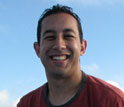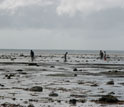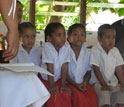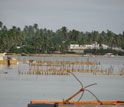News Release 09-195
Self-Sacrifice Among Strangers Has More to Do with Nurture than Nature
Culture is more important than genes to altruistic behavior in large-scale societies
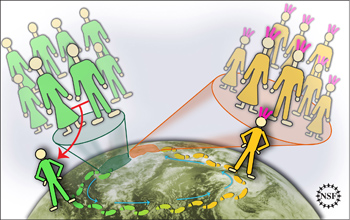
In this schematic representation, garb is a proxy for social behavior.
October 12, 2009
View an interview with researcher Adrian Bell of the University of California Davis.
This material is available primarily for archival purposes. Telephone numbers or other contact information may be out of date; please see current contact information at media contacts.
Socially learned behavior and belief are much better candidates than genetics to explain the self-sacrificing behavior we see among strangers in societies, from soldiers to blood donors to those who contribute to food banks. This is the conclusion of a study by Adrian V. Bell and colleagues from the University of California Davis in the Oct. 12 edition of Proceedings of the National Academy of Sciences.
Altruism has long been a subject of interest to evolutionary social scientists. Altruism presents them with a difficult line to argue: behaviors that help unrelated people while being costly to the individual and creating a risk for genetic descendants could not likely be favored by evolution, at least by common evolutionary arguments.
The researchers used a mathematical equation, called the Price equation, that describes the conditions for altruism to evolve. This equation motivated the researchers to compare the genetic and the cultural differentiation between neighboring social groups. Using previously calculated estimates of genetic differences, they used the World Values Survey (whose questions are likely to be heavily influenced by culture in a large number of countries) as a source of data to compute the cultural differentiation between the same neighboring groups. When compared they found that the role of culture had a much greater scope for explaining our pro-social behavior than genetics.
In applying their results to ancestral populations, the World Values Survey was less useful. But ancient cultural practices, such as exclusion from the marriage market, denial of the fruits of cooperative activities, banishment and execution happen now as they did then. These activities would have exerted strong selection against genes tending toward antisocial behavior, and presumably in favor of genes that predisposed individuals toward being pro-social rather than anti-social. This would result in the gene-culture coevolution of human prosocial propensities.
Bell is currently continuing his research in Tonga, where he is planning through ethnography to estimate statistically what social learning behaviors people have in general that may explain the distribution of cultural beliefs across the Tongan Islands. He is developing a survey instrument that will help capture people's cultural beliefs and measure the effect of migration on the similarities and differences between populations.
This research is supported by the National Science Foundation's directorate for social, behavioral and economic sciences.
-NSF-
-
View Video
Adrian Bell is doing research in Tonga about impact of culture versus evolution on social behavior.
Credit and Larger Version -
Tongans collecting shellfish on the reef at low tide in Ha'apai.
Credit and Larger Version -
School children in the village of 'Ofu are shown in class.
Credit and Larger Version -
Pandanus leaves are shown soaking in the ocean in Ha'apai.
Credit and Larger Version
Media Contacts
Maria C. Zacharias, NSF, (703) 292-8454, email: mzachari@nsf.gov
Principal Investigators
Adrian V. Bell, University of California Davis, email: avbell@gmail.com
The U.S. National Science Foundation propels the nation forward by advancing fundamental research in all fields of science and engineering. NSF supports research and people by providing facilities, instruments and funding to support their ingenuity and sustain the U.S. as a global leader in research and innovation. With a fiscal year 2023 budget of $9.5 billion, NSF funds reach all 50 states through grants to nearly 2,000 colleges, universities and institutions. Each year, NSF receives more than 40,000 competitive proposals and makes about 11,000 new awards. Those awards include support for cooperative research with industry, Arctic and Antarctic research and operations, and U.S. participation in international scientific efforts.
Connect with us online
NSF website: nsf.gov
NSF News: nsf.gov/news
For News Media: nsf.gov/news/newsroom
Statistics: nsf.gov/statistics/
Awards database: nsf.gov/awardsearch/
Follow us on social
Twitter: twitter.com/NSF
Facebook: facebook.com/US.NSF
Instagram: instagram.com/nsfgov



